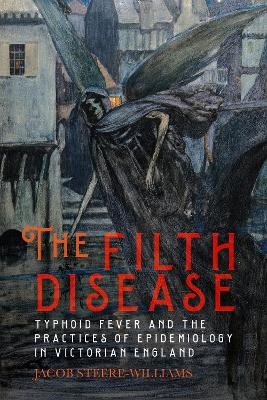
The Filth Disease
Typhoid Fever and the Practices of Epidemiology in Victorian England
Seiten
2024
University of Rochester Press (Verlag)
978-1-64825-081-1 (ISBN)
University of Rochester Press (Verlag)
978-1-64825-081-1 (ISBN)
Shows how the investigation of local outbreaks of typhoid fever in Victorian Britain led to the emergence of the modern discipline of epidemiology as the leading science of public health
Typhoid fever is a food- and water-borne infectious disease that was insidious and omnipresent in Victorian Britain. It was one of the most prolific diseases of the Industrial Revolution. There was a palpable public anxiety aboutthe disease in the Victorian era, no doubt fueled by media coverage of major outbreaks across the nation, but also because Queen Victoria's husband, Prince Albert, died of the disease in 1861. Their son and heir, Prince Albert Edward, contracted and nearly succumbed to typhoid a decade later in 1871.
The Filth Disease shows that typhoid was at the center of a number of critical debates about health, science, and governance. Victorian public health reformers, the book argues, working in central and local government, framed typhoid as the most pressing public health problem in order to persuade local officials to implement sanitary infrastructure to prevent the spread of disease. In this period British epidemiologists uncovered how typhoid is spread via food and water supplies, disrupting the longstanding idea that typhoid was spread via filth. In the process the modern disciple of epidemiology emerged as the chief science of public health. Typhoid was as much a social and political problem as it was a scientific one, and The Filth Disease provides a striking reminder of the cultural context in which infectious diseases strike populations and how scientists study them.
Typhoid fever is a food- and water-borne infectious disease that was insidious and omnipresent in Victorian Britain. It was one of the most prolific diseases of the Industrial Revolution. There was a palpable public anxiety aboutthe disease in the Victorian era, no doubt fueled by media coverage of major outbreaks across the nation, but also because Queen Victoria's husband, Prince Albert, died of the disease in 1861. Their son and heir, Prince Albert Edward, contracted and nearly succumbed to typhoid a decade later in 1871.
The Filth Disease shows that typhoid was at the center of a number of critical debates about health, science, and governance. Victorian public health reformers, the book argues, working in central and local government, framed typhoid as the most pressing public health problem in order to persuade local officials to implement sanitary infrastructure to prevent the spread of disease. In this period British epidemiologists uncovered how typhoid is spread via food and water supplies, disrupting the longstanding idea that typhoid was spread via filth. In the process the modern disciple of epidemiology emerged as the chief science of public health. Typhoid was as much a social and political problem as it was a scientific one, and The Filth Disease provides a striking reminder of the cultural context in which infectious diseases strike populations and how scientists study them.
JACOB STEERE-WILLIAMS is an Associate professor of history at the College of Charleston. He received his Ph.D. in history from the University of Minnesota in 2011.
Typhoid Cultures and Framing the Filth Disease
A Royal Thanksgiving: Disease and the Victorian Social Body
A Good Working Theory: Water and the Methods of Outbreak Investigation before 1880
Nature's Not-So Perfect Food: The Epidemiology of Milk-Borne Typhoid
Soils, Stools, and Saprophytes: Epidemiology in the Age of Bacteriology
Typhoid in the Tropics: Imperial Bodies, Warfare, and the Reframing of Typhoid as a Global Disease
The Afterlife of Victorian Typhoid
| Erscheinungsdatum | 15.02.2024 |
|---|---|
| Reihe/Serie | Rochester Studies in Medical History |
| Zusatzinfo | 35 b/w illus. |
| Verlagsort | Rochester |
| Sprache | englisch |
| Maße | 152 x 229 mm |
| Gewicht | 466 g |
| Themenwelt | Geisteswissenschaften ► Geschichte ► Regional- / Ländergeschichte |
| Geschichte ► Teilgebiete der Geschichte ► Kulturgeschichte | |
| Studium ► Querschnittsbereiche ► Epidemiologie / Med. Biometrie | |
| Studium ► Querschnittsbereiche ► Geschichte / Ethik der Medizin | |
| Studium ► Querschnittsbereiche ► Prävention / Gesundheitsförderung | |
| ISBN-10 | 1-64825-081-5 / 1648250815 |
| ISBN-13 | 978-1-64825-081-1 / 9781648250811 |
| Zustand | Neuware |
| Informationen gemäß Produktsicherheitsverordnung (GPSR) | |
| Haben Sie eine Frage zum Produkt? |
Mehr entdecken
aus dem Bereich
aus dem Bereich
der stille Abschied vom bäuerlichen Leben in Deutschland
Buch | Hardcover (2023)
C.H.Beck (Verlag)
23,00 €
vom Mittelalter bis zur Gegenwart
Buch | Softcover (2024)
C.H.Beck (Verlag)
12,00 €


